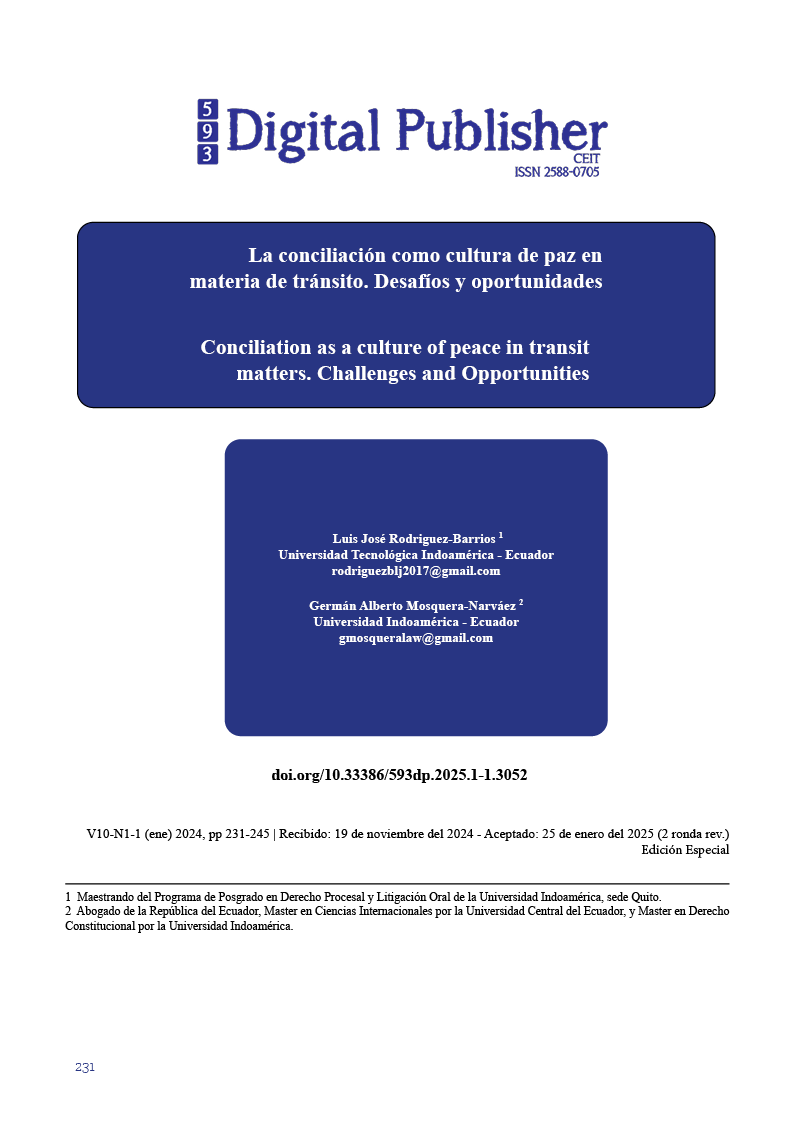Conciliation as a culture of peace in transit matters. challenges and opportunities
Main Article Content
Abstract
Conciliation is an alternative method of resolving intra-process conflicts that allows the parties to reach an agreement freely and voluntarily, as long as the matter is transmissible. In the context of traffic matters in Ecuador, this mechanism is especially relevant in offering a quick and friendly solution to conflicts arising from road incidents, as long as they do not involve death, loss of an organ or permanent disability of a person. . Traffic accidents in Ecuador are one of the main causes of injuries, deaths and material damage, and handling these incidents through judicial means is long and expensive. Conciliation, being an alternative method, offers a faster and less adversarial way to resolve these conflicts, promoting a culture of peace in the country. However, not all people know the procedures and benefits of conciliation in traffic matters, which prevents them from considering this option as a viable and efficient alternative. Promoting a culture of peace in Ecuador is crucial, as the judicial system faces significant backlogs and delays, making it difficult to obtain timely reparations for harmed people. There is a perception that conciliation is less effective or legitimate than a court ruling, which deters people from opting for this mechanism. Thus, the question arises about the legal nature of conciliation in transit matters in Ecuador, considering the restrictions and potential benefits offered by this alternative method of conflict resolution.
Downloads
Article Details

This work is licensed under a Creative Commons Attribution-NonCommercial-ShareAlike 4.0 International License.
1. Derechos de autor
Las obras que se publican en 593 Digital Publisher CEIT están sujetas a los siguientes términos:
1.1. 593 Digital Publisher CEIT, conserva los derechos patrimoniales (copyright) de las obras publicadas, favorece y permite la reutilización de las mismas bajo la licencia Licencia Creative Commons 4.0 de Reconocimiento-NoComercial-CompartirIgual 4.0, por lo cual se pueden copiar, usar, difundir, transmitir y exponer públicamente, siempre que:
1.1.a. Se cite la autoría y fuente original de su publicación (revista, editorial, URL).
1.1.b. No se usen para fines comerciales u onerosos.
1.1.c. Se mencione la existencia y especificaciones de esta licencia de uso.
References
Alexy, R. (2001). Teoría de los Derechos Fundamentales. Madrid: Centro de Estudios Políticos y Constitucionales.
Ávila R. (2011). El neoconstitucionalismo transformador. Quito: Editorial Abya Yala.
Escudero, J. (2013). Reconocimiento constitucional del derecho a la reparación integral y su complicado desarrollo en Ecuador. En Manual de Justicia Constitucional ecuatoriana, Jorge Benavides y Johel Escudero editores. Quito: CEDEC.
Ferrajoli, L. (2001). La democracia constitucional. En Desde otra mirada. Textos de teoría crítica del derecho, Christian Courtis, comp. Buenos Aires: EUDEBA.
García A. (2007). Derechos y pretexto: Elementos de crítica del neoconstitucionalismo. En Teoría del neoconstitucionalismo, Miguel Carbonell, edit. Madrid: Trotta.
Zagrebelsky, G. (2009). El derecho dúctil. Madrid: Trotta.
Durán Chávez, C., Égüez Valdivieso, E., Arandi Viñamagua, A., & Yancha Ruiz , M. (2020). Catálogo de materias y asuntos transigibles en mediación en la república del ecuador. Revista Metropolitana de Ciencias Aplicadas, 71-81.
García Narváez, P., & Galarza Castro, C. (2023). La conciliación en materia de tránsito y el principio de igualdad formal. Ciencia UNEMI, 55 - 70.
Nathaly, J., & Carlos, D. (2019). El Ecuador no vive en paz, vive en paz imperfecta. Defensa y Justicia, 1-35.



